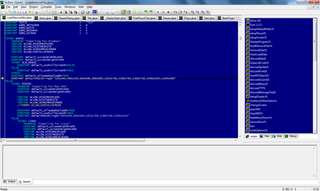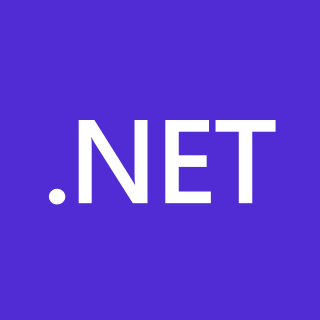Related Research Articles

Common Lisp (CL) is a dialect of the Lisp programming language, published in American National Standards Institute (ANSI) standard document ANSI INCITS 226-1994 (S20018). The Common Lisp HyperSpec, a hyperlinked HTML version, has been derived from the ANSI Common Lisp standard.

The GNU Compiler Collection (GCC) is an optimizing compiler produced by the GNU Project supporting various programming languages, hardware architectures and operating systems. The Free Software Foundation (FSF) distributes GCC as free software under the GNU General Public License. GCC is a key component of the GNU toolchain and the standard compiler for most projects related to GNU and the Linux kernel. With roughly 15 million lines of code in 2019, GCC is one of the biggest free programs in existence. It has played an important role in the growth of free software, as both a tool and an example.
C++Builder is a rapid application development (RAD) environment for developing software in the C++ programming language. Originally developed by Borland, as of 2009 it is owned by Embarcadero Technologies, a subsidiary of Idera. C++Builder can compile apps for Windows, iOS, macOS, and Android. It includes tools that allow drag-and-drop visual development, making programming easier by incorporating a WYSIWYG graphical user interface builder.

LLVM is a set of compiler and toolchain technologies that can be used to develop a frontend for any programming language and a backend for any instruction set architecture. LLVM is designed around a language-independent intermediate representation (IR) that serves as a portable, high-level assembly language that can be optimized with a variety of transformations over multiple passes. The name LLVM originally stood for Low Level Virtual Machine, though the project has expanded and the name is no longer officially an initialism.
An incremental compiler is a kind of incremental computation applied to the field of compilation. Quite naturally, whereas ordinary compilers make a so-called clean build, that is, (re)build all program modules, an incremental compiler recompiles only modified portions of a program.

GNU Ubiquitous Intelligent Language for Extensions is the preferred extension language system for the GNU Project and features an implementation of the programming language Scheme. Its first version was released in 1993. In addition to large parts of Scheme standards, Guile Scheme includes modularized extensions for many different programming tasks.

Code::Blocks is a free, open-source cross-platform IDE that supports multiple compilers including GCC, Clang and Visual C++. It is developed in C++ using wxWidgets as the GUI toolkit. Using a plugin architecture, its capabilities and features are defined by the provided plugins. Currently, Code::Blocks is oriented towards C, C++, and Fortran. It has a custom build system and optional Make support.

Chicken is a programming language, specifically a compiler and interpreter which implement a dialect of the programming language Scheme, and which compiles Scheme source code to standard C. It is mostly R5RS compliant and offers many extensions to the standard. The newer R7RS standard is supported through an extension library. Chicken is free and open-source software available under a BSD license. It is implemented mostly in Scheme, with some parts in C for performance or to make embedding into C programs easier.

Google Web Toolkit, or GWT Web Toolkit, is an open-source set of tools that allows web developers to create and maintain JavaScript front-end applications in Java. It is licensed under Apache License 2.0.
The following tables list notable software packages that are nominal IDEs; standalone tools such as source-code editors and GUI builders are not included. These IDEs are listed in alphabetic order of the supported language.
Chez Scheme is a programming language, a dialect and implementation of the language Scheme which is a type of Lisp. It uses an incremental native-code compiler to produce native binary files for the x86, PowerPC, and SPARC processor architectures. It has supported the R6RS standard since version 7.9.1. It is free and open-source software released under an Apache License, version 2.0. It was first released in 1985, by R. Kent Dybvig, originally licensed as proprietary software, and then released as open-source software on GitHub on 2016-05-13 with version 9.4.
Visual Studio is an integrated development environment (IDE) from Microsoft. It is used to develop computer programs including websites, web apps, web services and mobile apps. Visual Studio uses Microsoft software development platforms such as Windows API, Windows Forms, Windows Presentation Foundation, Windows Store and Microsoft Silverlight. It can produce both native code and managed code.
Oracle Developer Studio, formerly named Oracle Solaris Studio, Sun Studio, Sun WorkShop, Forte Developer, and SunPro Compilers, is the Oracle Corporation's flagship software development product for the Solaris and Linux operating systems. It includes optimizing C, C++, and Fortran compilers, libraries, and performance analysis and debugging tools, for Solaris on SPARC and x86 platforms, and Linux on x86/x64 platforms, including multi-core systems.

GLBasic is a commercial BASIC programming language that can compile to various platforms including Windows, Linux, Mac OS X, and some handheld devices. The language is designed to be simple and intuitive.

The .NET Framework is a proprietary software framework developed by Microsoft that runs primarily on Microsoft Windows. It was the predominant implementation of the Common Language Infrastructure (CLI) until being superseded by the cross-platform .NET project. It includes a large class library called Framework Class Library (FCL) and provides language interoperability across several programming languages. Programs written for .NET Framework execute in a software environment named the Common Language Runtime (CLR). The CLR is an application virtual machine that provides services such as security, memory management, and exception handling. As such, computer code written using .NET Framework is called "managed code". FCL and CLR together constitute the .NET Framework.

.NET Compiler Platform, also known by its codename Roslyn, is a set of open-source compilers and code analysis APIs for C# and Visual Basic (VB.NET) languages from Microsoft.

Mono is a free and open-source .NET Framework-compatible software framework. Originally by Ximian, it was later acquired by Novell, and is now being led by Xamarin, a subsidiary of Microsoft and the .NET Foundation. Mono can be run on many software systems.

The .NET platform is a free and open-source, managed computer software framework for Windows, Linux, and macOS operating systems. The project is mainly developed by Microsoft employees by way of the .NET Foundation and is released under an MIT License.

AssemblyScript is a TypeScript-based programming language that is optimized for, and statically compiled to, WebAssembly. Resembling ECMAScript and JavaScript, but with static types, the language is developed by the AssemblyScript Project with contributions from the AssemblyScript community.
References
- 1 2 "Overview". The Larceny Project. Retrieved 9 August 2017.
- ↑ "Twobit". The Larceny Project. Retrieved 9 August 2017.
- 1 2 3 "Download". The Larceny Project. Retrieved 9 August 2017.
- 1 2 "Download (Petit)". The Larceny Project. Retrieved 9 August 2017.
- 1 2 "Download Common Larceny". The Larceny Project. Retrieved 9 August 2017.
- ↑ "Licensing". The Larceny Project. Retrieved 9 August 2017.